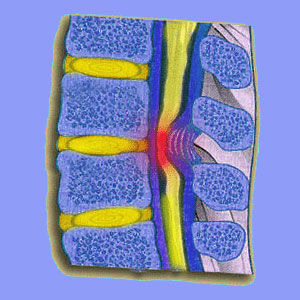
Sciatica from cancer can be a very disabling consequence of this dreaded disease or a possible side-effect of the many treatments offered to battle it. Cancer is one of the major health concerns of our time and the fight against it still has a long way to go. Sciatica can often be related to cancer either due to purely anatomical reasons or even through the psychoemotional consequences of this ravaging disease.
This informative article will explore the relationship between cancer and sciatic nerve pain. We will investigate why symptoms in the buttocks, legs and feet may be related to cancer, or cancer treatment, and seek to provide possible solutions for affected patients.
Sciatica from Cancer Symptoms
Sciatica symptoms can be remarkably similar no matter what the source of pain truly is. Usually, there is some degree of actual pain in the buttocks, legs or feet, accompanied by some or all of the following neurological symptoms: tingling, burning, numbness or weakness. Cancer-related sciatica falls into 2 main symptomatic expressions. The first is a dull aching typically associated with treatment modalities and the other is acute and fierce symptoms often sourced by the cancerous growth itself.
Of course, just because cancer and sciatica exist in the same patient, at the same time, does not mean they are inherently related. Cancer patients can endure all the usual causes of sciatica, including spinal and nonspinal structural explanations, as well as nonstructural and unrelated disease processes which might also enact sciatic nerve suffering.
Proper diagnosis of any sciatica syndrome will help to provide relief and needed treatment for the back and leg pain, as well as the cancerous conditions themselves.
Neoplastic Process Sciatica
Sciatica due to the actual cancer is often one of the first symptoms which causes a person to visit their doctor and eventually results in the cancer diagnosis. These conditions exist mostly due to a cancerous growth on the spine or in the affected musculature of the back, buttocks or legs.
Sometimes, the tumor grows directly on a nerve structure. Occasionally, the cancer scare turns out to be mistake, as the growth may be a benign tumor, such as a large lipoma, although the pain is surely still an issue.
Cancer treatments, such as radiation and especially chemotherapy, can cause back pain and sciatica in many patients. Most of these painful conditions are dull and chronic, although some may flare up to become acute issues. If your symptoms turn severe, or just add too much extra agony to deal with, consider talking to your doctor about revising your cancer therapies to include those which are likely to lessen symptomatic overlay.
Sciatica from Cancer Advice
Cancer is a life changing experience for those who survive and recover. The process of beating cancer is awe inspiring, but takes its toll on even the strongest patients. There is sure to be considerable suffering and sacrifice along the way, but sometimes, these allowances must be made in order to find that light at the end of the tunnel.
Sciatica is the last thing a cancer sufferer needs to deal with, but the unfortunate reality makes it commonplace. Remember also that cancer patients are still susceptible to developing psychosomatic sciatica, just like any of us. If your doctor can not find a clear link between your particular type of cancer or treatments and the source of you sciatica, consider trying knowledge therapy to uncover the mindbody issues which may be the underlying causation.
It is quite obvious that the tremendous emotional burden of cancer might be all that is needed to commence mindbody symptoms, either during the fight or after the remission.





